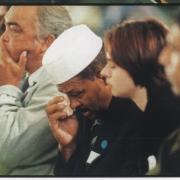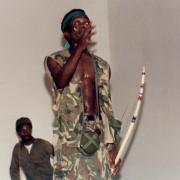Exploring the Role of Youth in Truth and Reconciliation
Summary Available
Reconciliation and peacebuilding rest upon knowing as complete a picture as possible of the nature, causes, and extent of gross violations of human rights that have been committed. Investing in the education of youth is important because it expands their worldview and challenge stereotypes. By successfully doing so, youth can actively participate in shaping lasting peace and contribute to justice and reconciliation in their respective societies. For example, Canada has integrated meaningful reconciliation into classrooms and workshops to help learn about its history of colonization and think creatively about the future. South Africa has also recognized the importance of educational reform in order to address the problem of reconciliation and conflict transformation in youth. The importance of empowering youth to engage and take an active role in non-violence, dialogue, and reconciliation was at the center of this conversation of the potential roles that youth can take in truth and reconciliation at both the local and global level.


 The Center for Victims of Torture (CVT) has instituted an intensive training and supervision model for refugees to develop local capacity for providing understanding and skills for mental health support to rebuild communities after massive human rights atrocities. CVT has instituted the training model in refugee camps in Guinea and Sierra Leone for refugees from Sierra Leone and Liberia. The model combines intensive, hands-on training of refugees with ongoing supervision.
The Center for Victims of Torture (CVT) has instituted an intensive training and supervision model for refugees to develop local capacity for providing understanding and skills for mental health support to rebuild communities after massive human rights atrocities. CVT has instituted the training model in refugee camps in Guinea and Sierra Leone for refugees from Sierra Leone and Liberia. The model combines intensive, hands-on training of refugees with ongoing supervision.  The South African Truth and Reconciliation Commission (TRC) developed the concept of “briefers” to install a victim-friendly process. Victims were provided with the opportunity to testify and be supported before, during and after the process. The TRC selected briefers—chosen from the caring professions, such as ministers, social workers and nurses—from the community to provide this support. The briefers acted as volunteers and were trained to perform various tasks with regard to the entire structural process of the TRC.
The South African Truth and Reconciliation Commission (TRC) developed the concept of “briefers” to install a victim-friendly process. Victims were provided with the opportunity to testify and be supported before, during and after the process. The TRC selected briefers—chosen from the caring professions, such as ministers, social workers and nurses—from the community to provide this support. The briefers acted as volunteers and were trained to perform various tasks with regard to the entire structural process of the TRC.  Rebuilding Hope saw the need for an integrated healing process that would allow families and communities to accept child soldiers from Mozambique back into their lives. Acknowledging that traditional healers are often the first people community members approach when they need help, Rebuilding Hope psychologists approached the healers as well as other community leaders to be project partners.
Rebuilding Hope saw the need for an integrated healing process that would allow families and communities to accept child soldiers from Mozambique back into their lives. Acknowledging that traditional healers are often the first people community members approach when they need help, Rebuilding Hope psychologists approached the healers as well as other community leaders to be project partners.